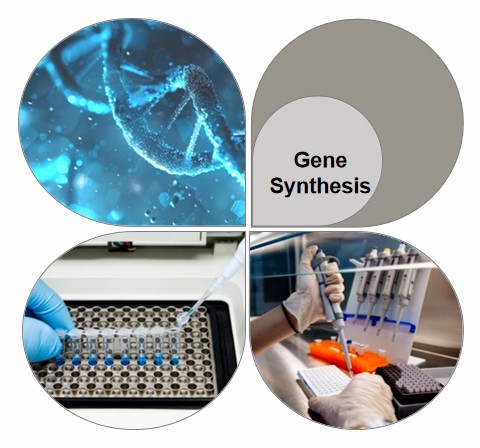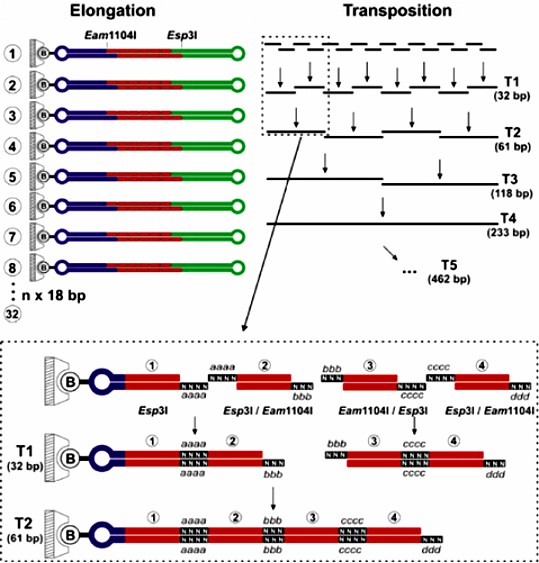The use of gene synthesis technology can contribute to life science research and play an important role in the development of gene therapy formulations. CD Formulation provides gene synthesis technology that allows for the precise design and sequence synthesis of target genes according to customer requirements, and so far we have completed many cases of gene therapy formulation development based on gene synthesis technology optimization.
Challenges in Gene Synthesis Technology
Traditional gene synthesis technologies may face problems of synthesis length and error rate, for example, high-throughput microarray synthesis technology is affected by biochemical efficiency, synthesis length is difficult to be improved, and the error rate is high. In addition, the synthesized products are in mixed state, which cannot efficiently separate a single oligonucleotide, and the quality homogeneity is unstable. In terms of assembly efficiency, the existing DNA synthesis technology has limitations in synthesis capacity and accuracy, and it is difficult to directly and accurately synthesize DNA fragments of gene length and many other problems, which further affects the accuracy as well as the efficiency of gene synthesis. In order to overcome the limitations of traditional gene synthesis technology in application, we have continuously optimized and developed new technology systems to better apply gene synthesis technology in gene therapy formulation development research.

Innovative Gene Synthesis Technology
We continue to develop optimized gene synthesis technologies, including cell-free DNA synthesis using microfluidics, enzymatic DNA synthesis methods that mimic natural DNA generation, high-throughput oligonucleotide synthesis, advanced DNA assembly techniques for creating long and complex DNA sequences, and software-based design tools for optimizing gene sequences. Our innovative gene synthesis technologies feature faster and more accurate production of synthetic DNA than traditional gene synthesis technologies.
Our Gene Synthesis Technology
Gene synthesis technology plays an indispensable role in the development of gene therapy formulations. Our current gene synthesis technologies include chemical synthesis, enzyme synthesis, DNA synthesis error correction and micro-automated synthesis. Gene synthesis technology has different principles, from step-by-step construction of chemical synthesis, to fragment splicing of genome synthesis, to high-precision repair of gene editing, and these technologies provide important support for the development and research of gene therapy formulations.
Enzymatic synthesis technology
The principles of enzymatic synthesis rely heavily on DNA polymerase, RNA polymerase, and ligase. In gene synthesis, this method creates DNA or RNA molecules by utilizing the ability of specific enzymes with greater precision and efficiency than traditional chemical synthesis methods. In addition, the enzymatic DNA synthesis technique requires less template for its application, thus showing greater advantages when dealing with complex sequences and modifications. Enzymatic synthesis methods utilize enzymes to synthesize DNA in a way that mimics natural processes in order to obtain potentially higher quality and longer DNA fragments.
Chemical synthesis technology
Chemical synthesis is the process of synthesizing nucleic acid strands step by step through chemical reactions, usually by solid phase synthesis. Chemical synthesis allows us to synthesize not only oligonucleotides for gene therapy research but also short gene fragments such as primers and probes.
DNA synthesis error correction technology
DNA synthesis error correction technology is essential to ensure the integrity of synthesized genetic material. This technology identifies and corrects errors during DNA synthesis through real-time monitoring, error detection and post-synthesis repair. The core mechanism is fluorescently labeled nucleotides to enable real-time observation and error correction. After synthesis, sequencing technology is used to further validate and correct DNA fragments to safeguard the quality and accuracy of the genetic material. Integrating error correction technology into the DNA synthesis process can significantly improve precision and efficiency, reduce downstream problems caused by DNA synthesis errors, and is critical for genetic research and applications.
Micro-automated synthesis technology
Microfluidic synthesis technology is a miniaturized and automated nucleic acid synthesis platform based on microfluidic technology. Its basic principle is to use microfluidic chips to control chemical reactions and synthesize nucleic acids through tiny reaction chambers. Microfluidic synthesis technology is characterized by high throughput in the development of gene therapy formulations, and multiple nucleic acid fragments can be synthesized at the same time, which greatly improves the experimental efficiency. Meanwhile, this technology requires low cost due to small reaction volume and low reagent consumption. We can also flexibly configure different synthesis modules as needed when synthesizing genes using this technology.
Procedure of Our Gene Synthesis Technology Services
- Gene sequence design and optimization. We provide gene sequence design and optimization services, including codon optimization, addition or modification of specific sequences, etc., according to customer needs. Designing and optimizing gene sequences helps ensure the quality of gene quality preparations.
- DNA synthesis. We provide high-quality DNA synthesis services to ensure the accuracy and purity of the synthesized DNA sequences. The length and complexity of synthesis can be adjusted according to demand, and from short fragments to longer gene sequences can be realized.
- Gene cloning and expression. After synthesis, we provide gene cloning and expression services. The synthesized genes are inserted into suitable vectors and expression studies are performed for functional analysis.
- DNA purification and characterization. We use efficient purification technology to purify the synthesized DNA and identify it by sequencing and other methods to ensure that it meets the design requirements.
 Fig.2 Our process of gene synthesis. (CD Formulation)
Fig.2 Our process of gene synthesis. (CD Formulation)
Highlights of Our Gene Synthesis Technology
- Experimental protocol design. Our designed and optimized experimental protocols will make the experiments more efficient and the results more accurate.
- Professional technical support. We help customers solve any technical and service queries throughout the process to ensure the smooth progress of their research.
- Quality control. Our strict quality control ensures the purity and stability of the synthesized genes, and we have met the demand for high-quality gene synthesis for our customers' research.
- Accuracy rate. Our advanced technology platform and experienced team of experts ensure the accuracy of the experiment results.
Explore Our Gene Synthesis Technology Related Services
Viral Gene Delivery Systems Development
Relying on viral vectors, we are able to deliver targeted genes. The development of viral gene delivery systems provides an important tool and plays a key role in the field of gene therapy research.
Non-Viral Gene Delivery Systems Development
Non-viral gene delivery systems utilize non-viral vectors to deliver genetic material to host cells, which have a higher biosafety and feasibility for large-scale production compared to viral vectors.
Plasmid DNA Production for Gene Therapy
Plasmid DNA production involves inserting the target gene into the plasmid DNA, introducing it into the host bacteria for replication by electroporation, harvesting the cells after they reach the desired density, and extracting the purified plasmid DNA.
Published Data
Technology: Enzymatic synthesis technology
Journal: Biotechniques
IF: 2.7
Published: 2008
New technological developments in high-throughput DNA sequencing have generated a wealth of sequence information from an ever-increasing number of species. This rapidly growing sequence information has provided the basis for enhanced DNA engineering approaches that have recently culminated in the complete chemical synthesis of the Mycoplasma genitalium genome. Other important applications of ab initio gene synthesis in biomedical research and biotechnology range from the cloning of individual genes to the development of synthetic DNA vaccines, gene therapy vectors, and more.
Most gene synthesis methods currently in use rely on enzymatic assembly of chemically synthesized complementary oligonucleotides by stepwise or multiplexed polymerase cycle assembly (PCA). PCA-based methods are inherently error-prone because of the high error rate of sequence mutations introduced during oligonucleotide synthesis and PCR amplification. To reduce errors, in this article, the authors develop a novel ligation strategy for chemical gene synthesis using building block technology, capable of high-quality ab initio oligonucleotide synthesis independent of target specificity and a few manual reaction steps, which is convenient, fast, and relatively low-cost.
 Fig.3 Synthesize larger fragments. (Van den Brulle J, et al,. 2008)
Fig.3 Synthesize larger fragments. (Van den Brulle J, et al,. 2008)
CD Formulation relies on the perfect and advanced gene synthesis technology platform and experienced technical team to provide customers with reliable gene synthesis technology service support and help your scientific research. If you are interested in us, please feel free to contact us.
References
- Van den Brulle J, et al. A novel solid phase technology for high-throughput gene synthesis. Biotechniques. 2008, 45(3):340-3.
Related Services


 Fig.2 Our process of gene synthesis. (CD Formulation)
Fig.2 Our process of gene synthesis. (CD Formulation) Fig.3 Synthesize larger fragments. (Van den Brulle J, et al,. 2008)
Fig.3 Synthesize larger fragments. (Van den Brulle J, et al,. 2008)